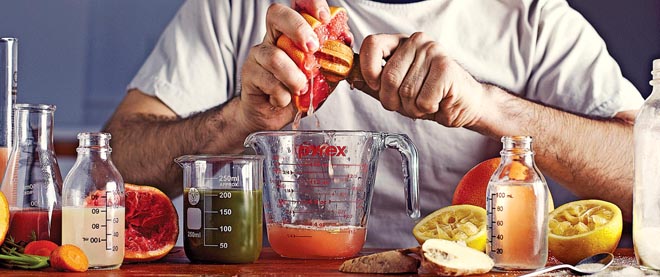If juice cleanses don’t really work, why are we hooked?
Juice-only detoxes are a growing trend — much to the alarm of health practitioners
Photograph by Liam Mogan
Share

On day two of her three-day juice cleanse, Lindsay Grange cracked open a kale, celery and cucumber cocktail that smelled like a salad and looked like a swamp. With a sigh, she chugged it back. “I went through a period of too much prepackaged food and not enough sleep. I wanted to kick-start healthy habits and lose some weight,” says the 32-year-old, on what attracted her to a juice-only detox. She’s not alone: the start of the year finds bloggers and reporters turning their detox diaries into articles, and juice cleanses are this year’s choice. Celebrities like Blake Lively and Gwyneth Paltrow have been photographed with designer bag in one hand and juice-cleanse bottle in the other. Salma Hayek’s company, Cooler Cleanse, delivers juice regimes across America.
Companies offering juice-only diets have been popping up across Canada, too. For about $50 a day, for three to seven days, businesses like Bava Juice in Calgary and the Juice Cleanse in Vancouver drop off bottles containing fruit, nut and vegetable juices on your doorstep, with promises to rest and detoxify the digestive system. Some, like Raw Raw in Burlington, Ont., and Total Cleanse in Toronto, claim they’ve had a 20 to 40 per cent jump in clients within the past 12 months.
Grange perused the Total Cleanse website and was sold by the modern, uncluttered label design, the photos of dew-laden produce. This was not the juicing of late-night Jack LaLanne infomercials—it was a hip, urban liquid accessory. “I liked that I didn’t have to cook or make any food decisions,” says Grange. But there was one problem. “I just could not function on the cleanse,” she says. “I was dizzy, nauseous, tired and couldn’t do my work.” By the end of day two, she’d tossed the juice in favour of a solid meal.
Grange could have saved herself the trouble, suggests Michael D. Gershon, professor of pathology and cell biology at Columbia University. “The inside of the gastrointestinal tract is simply not dirty in the sense that it needs cleansing,” he says. In other words, trying to clean out your digestive system as if it were a closet is misplaced effort.
But some experts say a placebo effect can be effective: believing you’re doing something good for your body, regardless of health benefits, is a powerful motivator. “We focus on resetting the system,” says Carol Belmonte of Belmonte Raw in Toronto. “Not just physically but spiritually and emotionally. We have a lot of repeat customers.”
Kathleen Martin Ginis, a professor of health and exercise psychology at McMaster University, says it’s no surprise juice diets are popular after the holidays. “It’s psychologically uncomfortable to think badly of ourselves. Society says a good person takes care of their body and it’s hard to reconcile that against the knowledge that you’ve willingly gone through a period of excess.” Most people use juice-only cleanses for weight loss, she points out, even though the claims are otherwise.
Psychologists use the term “licensing effect” to describe making a virtuous choice, then using that as license to make an indulgent choice. A juice-only cleanse after a binge works in reverse. But, says Gershon, if you torture your body one way, it’s not good to torture it in another. And a short period of purging may be more harmful than a short period of bingeing. “The gastrointestinal tract has a normal flora, healthy bacteria that is an intrinsic part of the gut, and when it gets disturbed we can invite bad bacteria to live there. When you do things like taking only juice, you risk changing the balance of the flora,” he says. He notes the body is wired to detoxify during overindulgence; a cleanse can damage that system.
“There’s a story we repeat when teaching statistics,” he says. “There’s a guy with one foot in a pail of ice water and one foot in a pail of boiling water and you ask him, ‘How do you feel?’ and he jokes, ‘On average, fine’. That’s what you’re doing: two extremes you’re convinced will level out. But they just don’t.”
After two days of juice, Grange was grateful for food and aimed not to take her body for granted. “I went back to healthy eating choices after the cleanse so, in that way, it worked.”